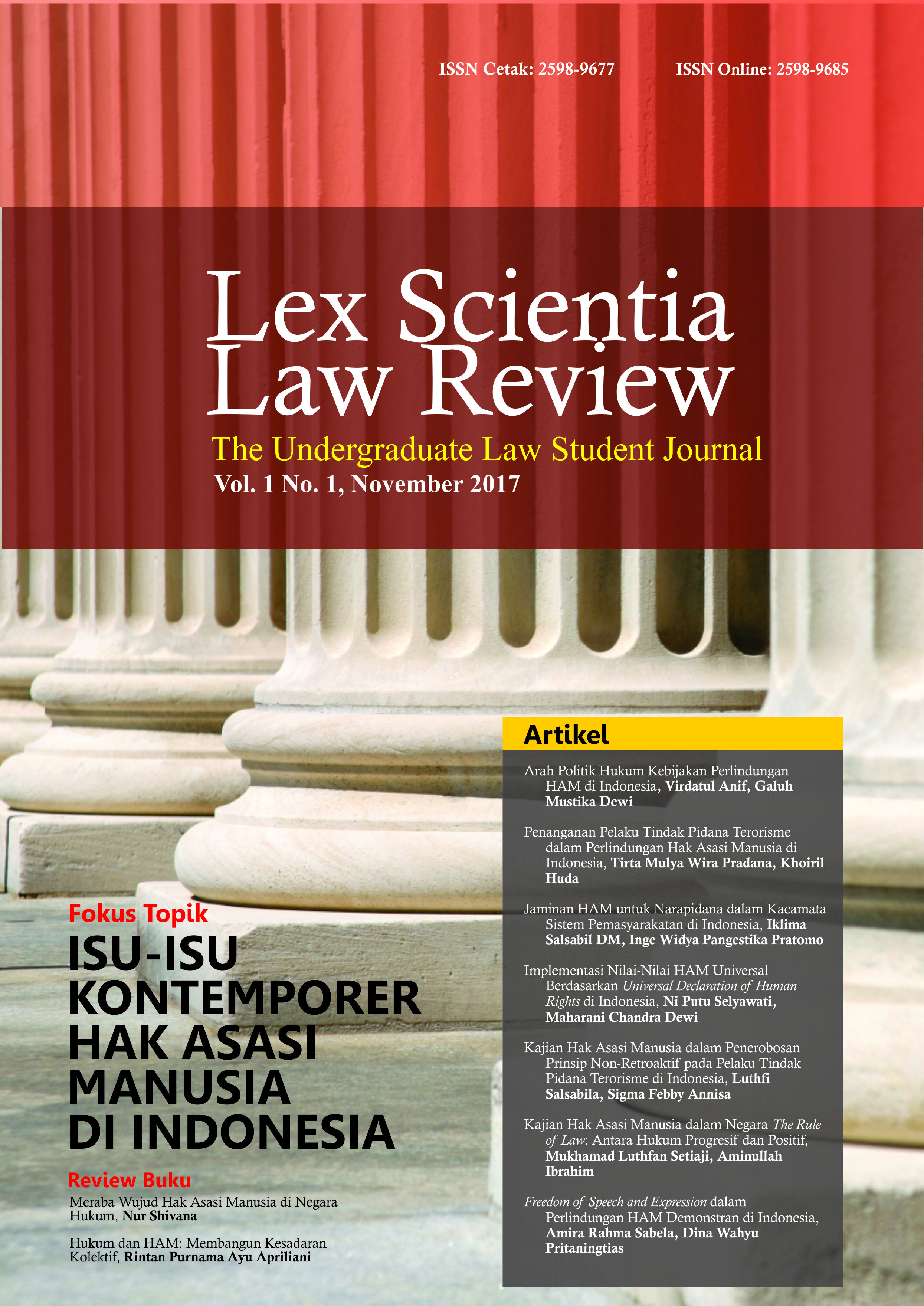Human Rights Perspective in Breaking the Principle of Non-Retroactiveness in Terrorism Crime Actors in Indonesia Kajian Hak Asasi Manusia dalam Penerobosan Prinsip Non-Retroaktif pada Pelaku Tindak Pidana Terorisme di Indonesia
Main Article Content
Abstract
As guarantees for human rights, the principle of legality and the principle of not being retroactive (non-reactive) is an important basis for law enforcement in Indonesia. This is because the law is not implemented based on the perception of the authorities or the regime, but based on statutory regulations that emerge from existing community agreements. The breakthrough of the principle of non-reactivity for perpetrators of criminal acts of terrorism, especially in the Bali Bombing I case, has generated a lot of debate. This paper tries to see how the study of the breakthrough of this principle from the perspective of human rights is a form of protection of basic human rights.
Article Details
All writings published in this journal are personal views of the authors and do not represent the view of this journal and the author's affiliated institutions. Authors retain the copyrights under this license, see our copyrights notice.
References
CCN Indonesia, “RUU Terorisme: Antara Ketegasan dan Pelanggaran HAM Joko Panji Sasongko”, online melalui https://www.cnnindonesia.com/nasional/20170531080044-12-218437/ruu-terorisme-antara-ketegasan-dan-pelanggaran-ham/
Departemen Pendidikan dan Kebudayaan. Kamus Besar Bahasa Indonesia. (Jakarta: Balai Pustaka, 1994).
Internasional Criminal Court (ICC) 1998.
Ketetapan MPR-RI No. III/MPR/2000 tentang Sumber Hukum dan Tata Urutan Peraturan Perundang-undangan.
Muhtada, Dani. “Legal Reform in Indonesia”. Journal of Indonesian Legal Studies 2, no. 2 (2017): 83-84. https://doi.org/10.15294/jils.v2i02.19438.
Prodjodikoro, Wirjono. Asas-Asas Hukum Pidana di Indonesia. (Jakarta: Refika Aditama, 2010).
Putusan MK No. 013/PUU-I/2003 tanggal 23 Juli 2004
Putusan Perkara Nomor 013/PUU-I/2003 dimuat dalam Berita Negara Republik Indonesia Nomor 61 Tahun 2004, Terbit Hari Jumat tanggal 30 Juli 2004
Rahayu, Rahayu. Hukum Hak Asasi Manusia. (Semarang: Badan Penerbit Universitas Diponegoro, Semarang).
Schabas, W. Introduction to the Internasional Criminal Court. (Cambridge: Cambridge University Press, 2004)
Sudarto, Sudarto. Hukum Pidana I. (Semarang: Yayasan Sudarto, 2013).
Sujatmoko, Andrey. Hukum HAM dan Hukum Humaniter. (Jakarta: Rajawali Pers, Jakarta, 2016).
Thontowi, Jawahir. "HAM di Negara-Negara Muslim dan Realitas Perang Melawan Teroris di Indonesia." Pandecta Research Law Journal 8, no. 2 (2013): 127-139.
Triffterer, O. Commentary on the Rome Statute of the Internasioanal Criminal Court. (Beck oHG: Verlag C.H, 2008)
Undang-Undang Nomor 39 tahun 1999 tentang Hak Asasi Manusia
Wignyosoebroto, Soetandyo. “Hubungan Negara dan Masyarakat dalam Konteks Hak Asasi Manusia: Sebuah Tinjauan Historic dari Perspektif Relativisme Budaya-Politik”, Seminar dan Lokakarya Hukum Nasional VIII, Bali (2003).
